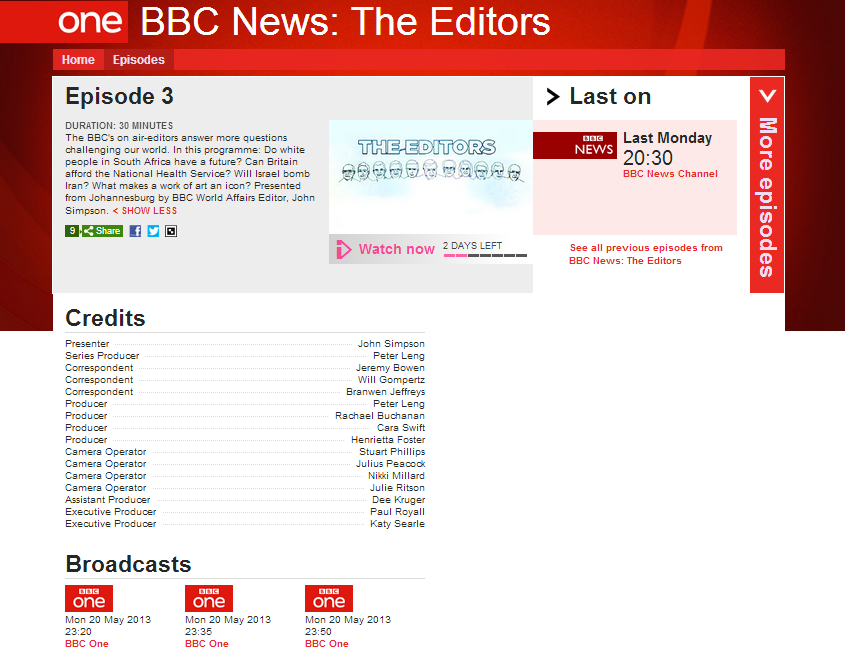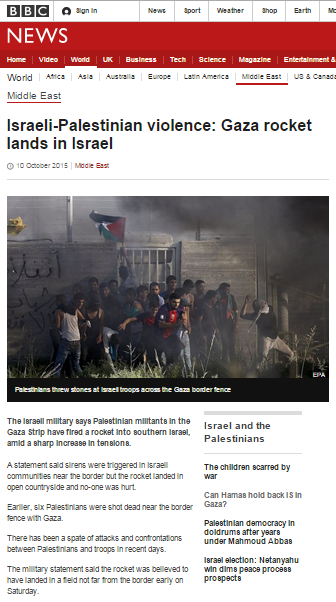On May 20th 2013 the BBC One programme ‘The Editors‘ included a filmed report by Jeremy Bowen which was also promoted on the Middle East page of the BBC News website and by BBC World News on its Youtube channel.
[youtube=http://www.youtube.com/watch?v=zatjOeqvlg8]
Bowen’s report is – interestingly – titled “Will Israel bomb Iran because of nuclear threat?”. He does not appear to be interested in getting his audience to think too much about the no less relevant counter question: will Iran bomb Israel? The item’s synopsis states:
“Middle East editor Jeremy Bowen explores what might happen if Iran continues with its nuclear programme.
Iran insists it does not want nuclear weapons but Israel and the United States refuse to believe its denials.
Our correspondent visits Israel and finds a widespread fear and distrust of Iran.
Could it be that Israel and the US will launch a pre-emptive strike against Iran, possibly launching a wider Middle East conflict?”
Right at the beginning of the video – at 0:21 – Bowen makes sure to inform viewers:
“Iran says it doesn’t want nuclear weapons. Israel already has them.”
Tellingly, Bowen makes no attempt to provide any sort of evidence to back the claim that Iran is not engaged in a military nuclear programme – beyond repeating regime statements. Obviously, the level of international activity surrounding the subject means that – unlike Bowen – those familiar with the subject are less inclined to take the rhetoric of a theocratic dictatorship at face value.
At 1:06 Bowen – in a very interesting choice of location at the Yad Mordechai Holocaust Museum – says:
“These days Israel is the most powerful country in the Middle East. But history makes some Israelis feel insecure.”
The theme of Israel as the most powerful country in the region is one of Bowen’s stock favourites, repeated in a variety of differing contexts. Quite how he defines “powerful” and the relevance of such a description in the context of Israel being surrounded on numerous borders by terrorist non-state actors backed by other regional powers is irrelevant. Bowen wants his audiences to reach the conclusion that Israeli concerns about Iran’s nuclear designs are exaggerated, irrational and even hysterical – with roots in the traumas of the past – and he implies that, inter alia, through his choice of location.
At 1:42 we find Bowen in Kibbutz Nachal Oz – situated right on the border with the Gaza Strip. With absolutely no relevance to the subject matter of the report, Bowen gratuitously states:
“In the twenty years or so that I’ve been crossing this border many more Palestinians than Israelis have been killed.”
He continues:
“But Israelis here, including Yael Lachiani, say Iran is now making it more dangerous for their families.”
In other words, audiences are given to understand that Iranian material and financial support to the terrorist organization Hamas is more a matter of Israeli opinion than cold, internationally recognised fact. They are also encouraged – by a man who is supposed to be an expert on the region – to relate to the subject of casualty numbers as an indicator of threat and danger, without any contextualisation of the intent behind those numbers.
Bowen’s speculations – and that is all they really are – regarding the likelihood of what he terms “a wider Middle East war as a result of an attack on Iran’s nuclear facilities” are notable not just because of the fact that they bring no new information to BBC audiences. The really remarkable aspect of this report is its deliberate blinkeredness: its wiping out of the equation the threat which Iran presents to Gulf countries and Saudi Arabia, its failure to place Iranian nuclear aspirations within the context of the wider Sunni – Shi’a conflict taking place right now on the Syrian, Iraqi and Lebanese stages and its underlying suggestion that there is not already a “wider Middle East war” going on at present.
But for Bowen it is enough that his audiences go away with the impression that if, as he states, “war becomes more likely”, it will be the “powerful” Israelis – spurred on to no small extent by hysteria and an irrational “widespread fear and distrust of Iran” – who are to blame for that.







